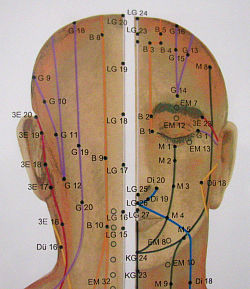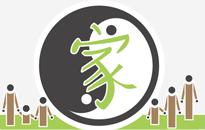Family doctors for parents & children
HOLISTIC
FAMILY
MEDICINE
Acupuncture
The word acupuncture comes from “acus” which means needle and “pungere” which means piercing. “Acupuncture” means nothing more and nothing less than treating by piercing with needles. The beginning of acupuncture goes back to some 4,000 years in China. It has been developed from the observations and experiences of Chinese doctors over the ages and is an important method of traditional Chinese medicine (TCM), one of the five modules of treatment alongside with herbal teas, nutrition, Tuina massage and Qigong.
Meanwhile, acupuncture has become well known all over the world. It was first and is most known as a method of pain treatment (“acupuncture anaethesia”). Using modern scientific methods, much has been researched into how acupuncture works. Research results suggest a series of possible mechanisms of action:
- through the increased production of morphin like substances in the body (such as Endorphine,
 Enkephaline), which decrease pain and relaxe the mind.
Enkephaline), which decrease pain and relaxe the mind. - through the neural effects which activate the neurological control mechanisms of pain
- through the reflex effects on internal organs: stimulation at acupuncture points, the skin and muscle areas influence the internal organs which are associated with the same segment
- the regulatory bioelectrical effect: linked to the “system of basic regulation according to Pischinger” which states that every cell of the body is connected with every other cell through the connective tissue. A needle stimulation at a specific point leads, through an information impulse, to changes of immune defense cells as well as to a self-multiplying flood of information.
Acupuncture works directly pain relieving, psychologically relaxing and activating on the skeletal muscular system (e.g. effects on paralysis). It can also regulate the immune defense system. Based on certain diagnoses according to TCM with the corresponding choice of points, acupuncture treatment exerts effects also on internal organs and metabolic processes. Besides pain syndromes, clinical examples where acupuncture is effective include acute and chronic problems of the respiratory tract ( recurrent coughs, bronchitis, asthma), of the intestinal tract (stomach pains, different digestive problems, reflux, abdominal distention, constipation and diarrhea, etc.), of the urogenital tract (recurrent cystitis, menstrual disorders and various women's ailments), also restlessness and sleep disturbances. Chronic and complicated problems require, however, most likely other treatments in addition to acupuncture.
Basically, acupuncture can treat what is disturbed but not, however, what has been destroyed. That means, above all, that functional problems which could still be reverted back to normal could be healed with the help of acupuncture.


